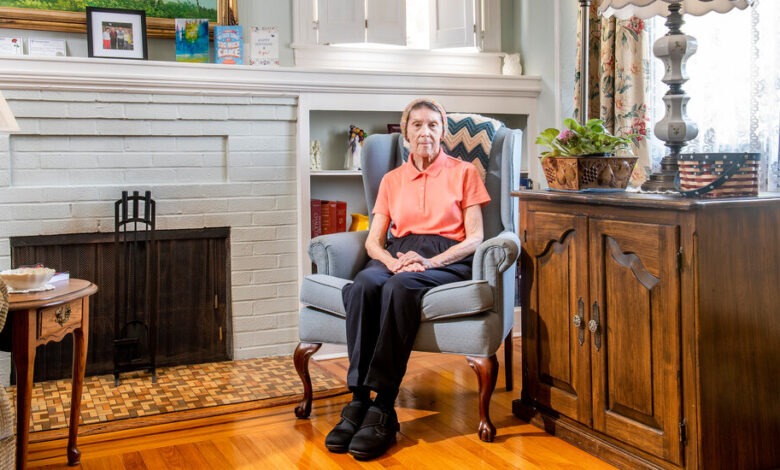For New York’s Anti-Abortion Veterans, Roe’s Fall Is Not a Full Victory

For local veterans of the anti-abortion movement, the Supreme Court’s June 24 decision reversing Roe v. Wade came with a sobering reminder: in New York, New Jersey and Connecticut, nothing had changed.
Abortion remains as legal as ever and will probably become more common here since the decision, not less. Money has poured into groups that provide abortions, including from state government coffers.
But for those in the metropolitan area who have been marching against abortion rights since the 1970s, such stalled progress is nothing new. For five decades, they have weathered defeat after defeat. While activists in other states successfully pushed through restrictions on abortion, in New York they have made no inroads in what was once called “the most liberal abortion law in the world.” New York’s state Medicaid program still pays for abortions, as do New Jersey’s and Connecticut’s.
New York’s battle has been grueling and divisive, with hostility on both sides, and virtually no change in public attitudes, which have consistently favored abortion rights.
What keeps the anti-abortion movement’s veterans going?
Some cite their faith; others, human rights concerns.
Jeanne Head, a retired obstetrics nurse who began campaigning against abortion rights in 1970, three years before the Roe decision guaranteed a constitutional right to an abortion, said she kept on because she had to: “I couldn’t live with myself unless I did what I could.”
At 90, she remains on the executive boards of the New York State and National Right to Life Committees. Since just before the pandemic she has been in Nebraska, away from her New York apartment. “How can I retire?” she asked.
Here are the stories of five people who joined her on this long journey.
The political operative who still has hope
‘This is a little bit of a start’
Jane Gilroy first got involved in the abortion issue at an evening discussion group among her parish in suburban Merrick, a hamlet on Long Island. It was 1969, and the group mainly discussed religious topics, but on that night someone mentioned a bill in the State Legislature that would legalize abortion in New York. For Ms. Gilroy, who is now 85 and still living on Long Island, it seemed an unlikely proposition.
“I thought, nobody will ever pass this,” she said. “We’ll just do whatever, then we’ll get back to the religious things I wanted to talk about.”
Yet after the discussion, Ms. Gilroy and others started to read up on the issue and became more engaged. With no experience in politics, they organized trips to the State Capitol to lobby legislators against the bill.
“We thought they were on our side,” Ms. Gilroy said. “One legislator said we were so nice, not like these feminists who yell and holler. He made it sound as if he liked us, and he was going to go with us.” Victory, she thought, was at hand.
But in April 1970, after a tumultuous debate and several reversals of votes, the New York Legislature narrowly passed a bill allowing unrestricted abortion until 24 weeks — at the time, the most liberal law in the nation. And from Ms. Gilroy’s suburban discussion group rose the New York State Right to Life Party, a precursor to the national party.
Read More on the End of Roe v. Wade
That summer Ms. Gilroy petitioned to run for governor on the party’s line, but 3,000 signatures on her nominating petition were deemed invalid, and she was excluded from the ballot.
Even so, she did not expect the 1970 abortion law to occupy her for long. The law had galvanized opposition to abortion, and in 1972, the State Legislature voted to repeal it. “We just rejoiced,” Ms. Gilroy said. “OK, the world is better now.”
It was to be the last of the movement’s major victories in New York — and very short-lived. When the repeal reached Gov. Nelson Rockefeller, a Republican, he vetoed it, restoring the 1970 law. The following year, the United States Supreme Court ruled that women had a constitutional right to an abortion, wiping out any state bans.
“What they thought was that we would go away,” Ms. Gilroy said. “But we persisted. We prayed together and we talked to each other, and we just learned more and more. That gave us consolation.”
This was to be their pattern for the next half-century: with each setback, a renewed push to keep going.
Last month’s Supreme Court decision reversing Roe v. Wade meant only more work for opponents of abortion, especially in states like New York.
“What it’s doing is enlivening the conversation,” Ms. Gilroy said of the court ruling. But after 50 years in the movement, she has adjusted her expectations. “I don’t know that it will be changed in my lifetime,” she said. “But this is a little bit of a start.”
The advocate who prayed in Washington
‘They’re not even listening to us’
In January 1973, when the Supreme Court decided Roe v. Wade, Phyllis Graham said she stared at the newspaper headline in disbelief.
“I dropped the paper and I wept,” Ms. Graham, now 91, said from her home on Long Island. “I wept and I wept. I was surprised by my own reaction, really, because it was legal here in New York State. But now it was in the Constitution of this fine country? I was really shook.”
That began Ms. Graham’s five-decade campaign against what she called “a terrible scourge, not only on the country, but on the world.” It also began the renewal of her Catholic faith.
Through her priest, she joined a group that was sending buses of people to Washington every month to lobby for a constitutional amendment banning abortion.
“One of the first times I walked through those halls of the Senate and the House, I thought, this is not going to work. You could see it was going in one ear and out the other. Before we left the building, I said to some of the women: ‘They’re not even listening. This is only going to be done by prayer.’ ” So they stood in the hallway and prayed.
Then on one of the bus trips, a woman approached her. “She said to me, ‘Phyllis, how is it that you don’t go to the underground Mass?’” The woman invited her to a Mass in an “underground” church that was still using Latin, rather than modern languages. When she got there, she said, it was filled with women from the anti-abortion group.
“That opened a tremendous door to me,” she said.
She also got involved in Phyllis Schlafly’s Eagle Forum and joined the campaign against the Equal Rights Amendment, which many believed would codify abortion rights. In 1976, she started a half-hour weekly radio show, “Eagle Forum Presents,” on a Long Island station, WALK.
She joined weekly vigils outside area abortion clinics and hospitals. It was “dreary” work, she said, because abortions were taking place inside. “That’s the heavy-heartedness that you went in there with. It wasn’t meanness towards the women. We were for the most part quiet.”
For the last decade or so, because of health problems, she has been unable to walk in the annual March for Life in Washington. But she has kept praying for change, even as laws remain untouched in New York.
And she has found comfort in another area. “I’m a Trumpie,” she said, robustly. “I love that man.”
While some have speculated that voters against abortion will abandon former President Donald J. Trump now that he has served their purpose, having appointed three justices to the Supreme Court, Ms. Graham — like several others interviewed for this article — remains steadfast. “I hope he gets back in,” she said.
She said she did not celebrate last month’s Supreme Court ruling but felt a “deep peace” afterward. As for what comes next, she said that was not her call.
“I keep praying every day that God’s will be done. I can’t figure everything out. I have a home to take care of.”
The feminist with different views
‘I was somewhat of a pariah’
Carol Crossed dates her opposition to abortion to 1973, when the Supreme Court decided Roe v. Wade, but she did not become active until much later.
She was living in upstate New York and was involved in the civil rights and antiwar movements, with a passion for Democratic politics and feminism.
Then one day a critic confronted her. With all her preaching on human rights, the woman asked, “Why don’t you ever say anything about the unborn?” The woman challenged Ms. Crossed to join her at the University of Rochester to listen to a speech by Mildred Jefferson, a surgeon and anti-abortion activist; Ms. Crossed, in turn, invited the woman to a speech by the Rev. Daniel J. Berrigan, the peace advocate.
“We became fast friends,” Ms. Crossed said. “I felt she really opened my eyes.” She started to see abortion as incompatible with nonviolence.
But as she shifted her focus to abortion, Ms. Crossed found herself in a lonely spot. Feminism, she thought, was “corroded” by its embrace of abortion rights, while the movement against abortion was often hostile to progressive causes she supported, including the Equal Rights Amendment. As the decades passed, she increasingly felt isolated within movements she cared about. She wanted no part of Mr. Trump, but she also felt no home in the Democratic Party.
“I was somewhat of a pariah,” she said.
Ms. Crossed, who is now 78 and living in western New York, finally found a sliver of comfort at a small organization called Feminists Choosing Life, which advocates “nonviolent feminism,” where she serves as the president.
She welcomed last month’s Supreme Court decision, she said. But she fears that the rancor it has kindled will further hurt progressives in other areas.
“We’re so focused on fighting one another over this issue that we’re losing ground,” she said.
The priest who befriended the other side
‘If there’s no dialogue, it’s just raw power competing on both sides’
The Rev. Frank Pavone, 63, had an answer to the divisions over abortion: Acknowledge good people on the other side.
He was in high school in Westchester County when Roe v. Wade was decided and a senior when he attended his first March for Life in Washington. The event solidified his intention to become a priest, leading ultimately to his becoming the national director of Priests for Life.
Father Pavone recognized early on that “there’s really no compromise on the principles that each side is standing for,” but that the two sides could work to understand each other, he said. “Because if there’s no dialogue, it’s just raw power competing on both sides.”
So he visited abortion clinics with providers and tried to develop relationships. At conventions of the National Right to Life Committee, he got to know William Baird, a reproductive rights activist and abortion provider whose health clinic in Hempstead, N.Y., was firebombed in 1979. Mr. Baird picketed the anti-abortion conventions every year.
The two adversaries developed a friendship. When the rhetoric of those fighting abortion got too heated, Mr. Baird asked Father Pavone to “appeal to your flock to stop hate speech.” One year Father Pavone helped Mr. Baird set up his seven-foot “Cross of Oppression” that the latter used at demonstrations. Later, in 2002, they issued a joint statement calling for “respectful dialogue” to reduce “dangerous, dehumanizing assumptions about those on the opposite side of the issue.”
Father Pavone, who now lives in Brevard County, Fla., now questions whether such dialogue is still possible, because the politics are so entrenched. But he hopes that last month’s Supreme Court decision in Dobbs v. Jackson Women’s Health Organization provides an opening.
“What changes now is that the conversation can breathe and open up,” he said. “What Dobbs is saying to proponents of Roe v. Wade, as it says to us, is: Make your case to the voters, to the legislators, as to why abortion should be legal. Make the case on its merits, not simply on a declaration from on high that this is a constitutional right. I think that’s a significant change that will come into political races, will come into legislative debates, will come into court cases, even in places like New York.”
The counselor who had an abortion
Women are ‘angry about the wrong thing’
Theresa Bonopartis had a legal abortion in New York before Roe v. Wade, and in the decades that followed, she said, she was tormented by guilt. She felt her father had pressured her into it, threatening to throw her out of the house if she went through with the pregnancy.
“I had low self-esteem,” she said. “I hated myself for caving in to the coercion.” She ended up in a bad marriage, dealing with depression and anxiety, and when she sought help from therapists, she said, they told her that her emotional problems did not arise from her abortion.
Finally, she said, she got help from a priest and a therapist who addressed her abortion.
Ms. Bonopartis, who is now 70, drew on that experience to start Lumina, a Catholic ministry in Westchester County that offers “post-abortion help.”
The American Psychological Association has long held that having an abortion is not linked to mental health issues but that being denied one is, a position supported by decades of research.
Ms. Bonopartis does not accept this view. “I understand that it doesn’t happen to everyone, but it happens to a lot of people,” she said. She said she gets calls from 200 women a year who say they are in emotional distress and need help. She refers some to mental health professionals, while others get spiritual counseling. It has become a quest for her, she said.
“It’s really crazy when you think about it. Women are made to feel like there’s something wrong with them if taking the life of their unborn child causes them to be upset.”
She has mixed feelings about the Supreme Court decision, she said, because “it was like saying, ‘Oops, we made a mistake’” in legalizing abortion for five decades. And even before the decision, she noted, Gov. Kathy Hochul committed $35 million to abortion providers in New York to help them deal with increased demand and bolster security. “People can’t afford food and gas, and she puts aside $35 million,” Ms. Bonopartis said.
“I understand why women are angry, but they’re angry about the wrong thing,” she said. “They should be angry about what abortion has done, not about overturning Roe v. Wade.”




